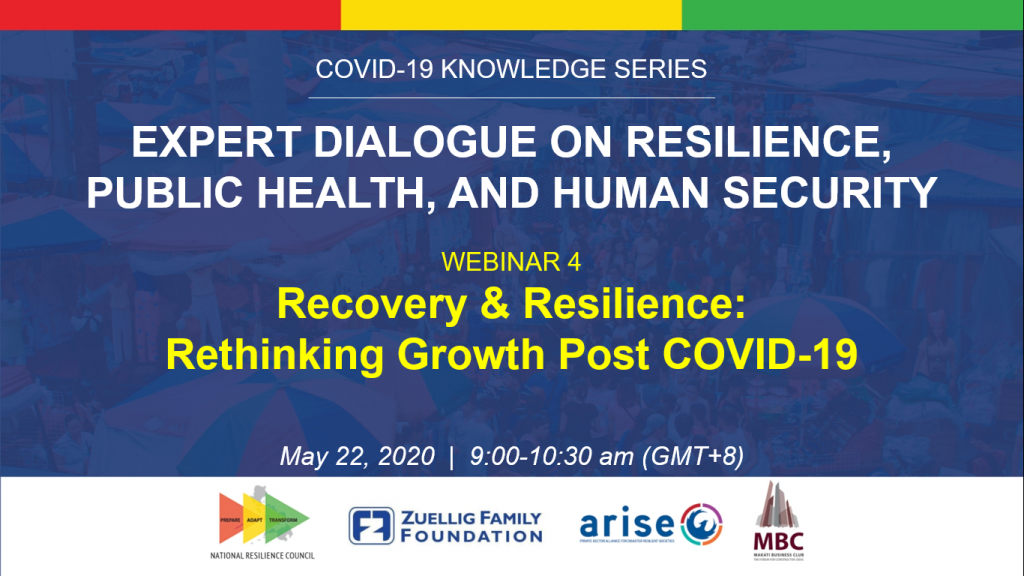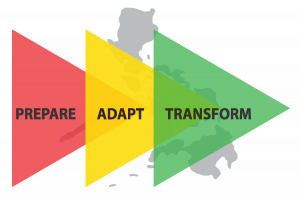Source: The Philippine Star – Filipino Worldview | Author: Ambassador Roberto R. Romulo | Date: May 29, 2020
Recently, the National Resilience Council (NRC) held its 4th Webinar conference hosted by the Makati Business Club, this time focusing on economic recovery and resilience. The guest speaker was BSP Governor Ben Diokno. DND Secretary Delfin Lorenzana and I made opening remarks on behalf of NRC.

In my opening remarks, I did not dwell on BSP’s policy response to the coronavirus disease 2019 or Covid-19 crisis, but rather shared my personal experiences in online banking necessitated by the quarantine which will be the new normal even after the pandemic as more and more transactions are made online. I raised the issue of legacy requirements for physical presence or documents to effect banking transactions. I asked what the BSP policy was with regards to digital cash; paperless exchange and “presenceless” authentication being adopted by an increasing number of countries.
As it turns out, the BSP’s policy response, aside from the monetary and prudential tools in its arsenal, included an emphasis on the extensive use of digital technology moving forward. The Governor is well suited to spearhead this effort. He had demonstrated his being tech-savvy when as budget secretary, he collaborated with DOST on a project called DIME (Digital Imaging for Monitoring and Evaluation). The objective was, using satellite imagery, to monitor the status and implementation of government projects (e.g. public works projects, irrigation projects).
Allow me to quote portions of the Governor’s expansive presentation on this topic:
“With the increased usage of non-bank channels to send/receive money, the BSP has been improving channels of remittances with the approval of new technologies in remittance transfers (mobile phones, internet, cash cards). However, insufficient IT infrastructure is leading to the slow internet connection, additional costs (e.g. online service fees), data privacy and cybersecurity risks, and lack of knowledge on new technologies may pose challenges in the implementation of financial digital services.”
“To expand the reach of digital transactions, we need to increase contactless payment facilities, such as PayMaya and GCash can be expanded to include wet markets, retail stores and public utility vehicles (jeep, taxis, tricycles, bus). The adoption of the QR code standard must be expedited to enable interoperable payments of person to person and person to merchant transactions. The scale of the recently launched EGOV Pay Facility can be expanded to enable ordinary citizens to digitally pay government taxes, fees and charges.”
Beyond banking, he cited that the demand for digital technology in the post-Covid world will increase exponentially as companies, schools and government agencies implement learn and work from home arrangements and virtual meetings. He further stressed that digital technology is key to strengthening the government’s monitoring and evaluation systems for policy responses and actions.
From my personal perspective, I was delighted that he stressed the importance of future proofing our workforce by strengthening the educational system, sustained upskilling and adequate health protection. As I said in the virtual conference, I recommend that BSP hire a cadre of young IT professionals (as stated by UN, our median age is 27.5) versed in today’s digital technology, employ them with competitive wages and train for the future, even sending them abroad.
The Governor also cited the expeditious implementation of the National ID system will enable inclusive and innovative digital finance and ensure reliable database for the design and impact assessment of policies, including those for taxation and social safety net purposes. Acting NEDA Secretary Karl Chua is also pushing for the acceleration of the National ID project.
The Governor will be well supported in his digital endeavor by competent BSP officers like Lilia Guillermo and Pia Roman-Tayag.
I have written about how supportive Sonny Dominguez is about our transition to the digital economy. Three government officials seem to have embraced the concept: “It’s the Digital Economy Stupid”. I hope the President listens.
Much has been written about the surprise acceptance by the President of Undersecretary Eliseo Rio’s resignation which was filed last January. For a time, Rio was the only visible DICT official. Secretary Gringo Honasan has been barely visible in contrast. But no worry, his replacement, my irrepressible friend, RJ Jacinto, is guaranteed to generate headlines with his controversial stance on issues like common cell towers.
I would like to see DICT take a leadership and more assertive role in leading us to the digital economy as is their mandate. But I am reminded to be careful what you wish for. With both DICT Secretary Honasan and RJ admitting they are not ICT experts, we may see a classic case of the Blind leading the Blind.
![]()


